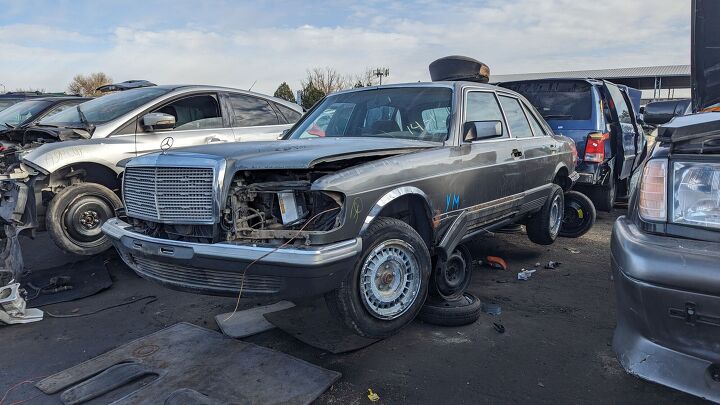Of all the European-market new cars that flooded into the United States during the wild gray-market years of the early and middle 1980s, the Mercedes-Benz W126 S-Class appears to have been the most popular. Today’s Junkyard Find is one of those cars, found in a self-service boneyard near Denver, Colorado.

I’d found several discarded gray-market W126s in Colorado car graveyards before spotting this one, including a 1980 280 SEL, a 1980 500 SE and a 1983 500 SEC. I’ve also found (what was almost certainly) a gray-market W108 proto-S-Class.

The easiest way to spot a gray-market W126 is to look for a cloth interior; U.S.-market cars got leather or MB-Tex inside.

European-market W126s have different headlights and bumpers, too, but the headlights usually get grabbed by the first junkyard shopper to recognize them.

When you brought a gray-market W126 (or R107) over, you got all the good Euro-market powertrain, appearance and interior stuff and you saved money versus the MSRP of that car’s counterpart in an American Mercedes-Benz dealership. It wasn’t for the faint of heart, but it could be done if you kept your wits about you.

By 1986, 60,000 gray-market cars a year were coming into the United States, the majority of them Stuttgart products, and the heads of Mercedes-Benz dealers here were exploding like a graphite-moderated/water-cooled Soviet nuclear reactor did that year.

After years of intensive Mercedes-Benz-backed lobbying, H.R.2628 aka the Imported Vehicle Safety Compliance Act of 1988 was passed by the 100th Congress. After that, imported cars had to be brought into strict compliance with the smallest fine print of federal vehicle standards, something almost no shops could handle. The gray-market party was over.

For the 1981 model year, the U.S.-market 380 SEL came with a 3.8-liter SOHC V8 rated at 155 horsepower and 196 pound-feet, which was pretty good on this side of the Atlantic at that time. The price tag on that car was $44,298, or about $157,037 in 2024 dollars.

Meanwhile, the version of this engine sold in West Germany made 215 horsepower and 169 pound-feet. The real gray-market cowboys bought the even more powerful 500 SEL, which wasn’t even available here until the 1984 model year.

1981 was the first model year for an optional driver’s-side airbag in the W126. This car has one.

It also has some kind of aftermarket radio-frequency device, maybe for one of the clunky car telephones of the era.

There’s no depreciation like European luxury car depreciation.

The gauge cluster was gone when I arrived, but a VIN search shows that it was auctioned off with 96,807 miles (or perhaps that was kilometers, though most gray-market W126s ended up getting non-metric gauge conversions).

This West German dealership promo video is for the W126 coupe, but you get the idea.

The W126 was sold in the United States through 1991, after which it was replaced by the flashier but flakier W140.

1981 Mercedes-Benz W126 in Colorado wrecking yard.

1981 Mercedes-Benz W126 in Colorado wrecking yard.

1981 Mercedes-Benz W126 in Colorado wrecking yard.

1981 Mercedes-Benz W126 in Colorado wrecking yard.

1981 Mercedes-Benz W126 in Colorado wrecking yard.

1981 Mercedes-Benz W126 in Colorado wrecking yard.

1981 Mercedes-Benz W126 in Colorado wrecking yard.

1981 Mercedes-Benz W126 in Colorado wrecking yard.

1981 Mercedes-Benz W126 in Colorado wrecking yard.
[Images: Author]
Become a TTAC insider. Get the latest news, features, TTAC takes, and everything else that gets to the truth about cars first by subscribing to our newsletter.

